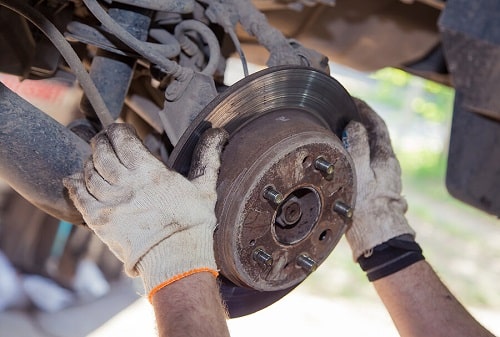Brake Service and Repair in Kenner, LA

Brake fade decreases a vehicle’s stopping power. But many people do not realize the brakes are low until they hear grinding—if they hear it.
The best way to keep the brakes in top condition is to have the techs at CAMS Automotive check them every time they rotate the tires. You should have this done every time you do an oil change.
Six Warning Signs of Failing Brakes
Besides having a certified technician at CAMS Automotive check your vehicle’s brakes in Kenner, LA, you should also look out for these signs:
- Grinding noises: You hear the tab on the brake pads scraping the rotors. If you do not change the brake pads, the tech may not be able to turn the rotors. The only option is to replace them.
- Vibration in the steering wheel: While uncommon, it does happen. The vibration is due to a warped rotor. The rotors could warp if they get too hot (for example, during mountain driving or heavy stop-and-go traffic). The pads will not sit on them properly, and you will lose stopping power.
- Mushy brake pedal: This symptom is caused by low brake pads. The lower the pads, the more brake fluid the system needs to compress the brakes against the rotors.
- Burning smell or smoke coming off the tires: The brakes are overheating. The thinner the pads, the easier they will overheat. A collapsed brake line or a stuck caliper could also cause the brake pads not to release when you lift your foot off the pedal. The pads rubbing on the rotors can get very hot and even cause a fire.
- Brake warning light: The brake light comes on when the brake fluid is low in the master cylinder. With no brake fluid, the system does not have enough pressure to press the pads against the rotors.
- Anti-lock brake system (ABS) warning light: This does not have anything to do with brake pads, but it will tell you if the ABS is not working. The brakes will still work, but the ABS won’t help you avoid a skid.
Brake System Functions and Maintenance
Your vehicle’s brake system is relatively simple.
However, when one part of the system malfunctions, it affects other parts and could cause more damage. Thus, these components need to be included in the maintenance.
- Anti-lock brake system (ABS): This is a computerized system that keeps your vehicle from skidding out of control when you lock the brakes.
- Brake fluid: It can absorb water from the air over time, which decreases the brake’s effectiveness and damage the system. Brake fluid flushes ensure your vehicle will have clean brake fluid.
- Brake hoses and lines: Most brake lines are made of metal. However, brake lines need flexibility near the calipers, so some are rubber to handle the highly pressurized system. Rubber lines may crack and leak with age. Metal lines could rust.
- Brake pads and shoes: Brake pads (with rotors) and brake shoes (with drums) provide stopping power. They get worn out over time. The calipers or wheel cylinders press the pads or shoes onto the rotor or drum, creating friction to stop the vehicle.
- Brake calipers: Most vehicles have pads and rotors instead of shoes and drums. The calipers hold the brake pads. When you step on the brakes, the master cylinder pushes brake fluid through the system, closing the calipers and pressing the pads against the rotor. While brake calipers last long, they also sometimes fail.
Call CAMS Automotive Today For Your Brake Service And Repair Needs
If you notice any of the above problems with your vehicle’s braking, contact CAMS Automotive in Kenner, LA for an appointment today. We’ll check and service your brakes for you as soon as possible, keeping you and your loved ones safe!